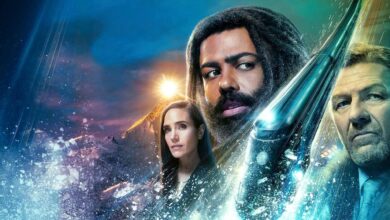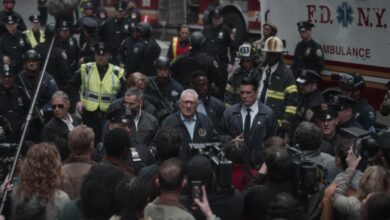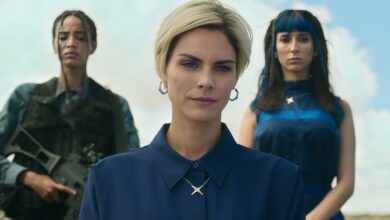Dune Prophecy Review: Will Especially Please Dennis Villeneuve Fans!
Dune Prophecy Review: Dune – Prophecy is committed to telling what was not explored in Dune, the Bene Gesserit Sisterhood. In the six episodes, the TV series, coming November 18, 2024, on HBO, immerses us again in the universe born from the pen of Frank Herbert, and the references are many, starting with its solid photography. Dune: Prophecy is however based on the novel Sisterhood of Dune by Brian Herbert and Kevin J. Anderson and provides – or at least tries to – a complete picture of the science fiction world of Arrakis. Set approximately 10,000 years before the events of Dune (and therefore before the birth of its iconic protagonist Paul Atreides), the story follows the genesis of Sisterhood through the story of Valya Harkonnen and her sister Tula. The first, ambitious from a young age, is destined to create something great and wins the sympathy of her superior, who chooses her as her pupil – and then takes power by force.
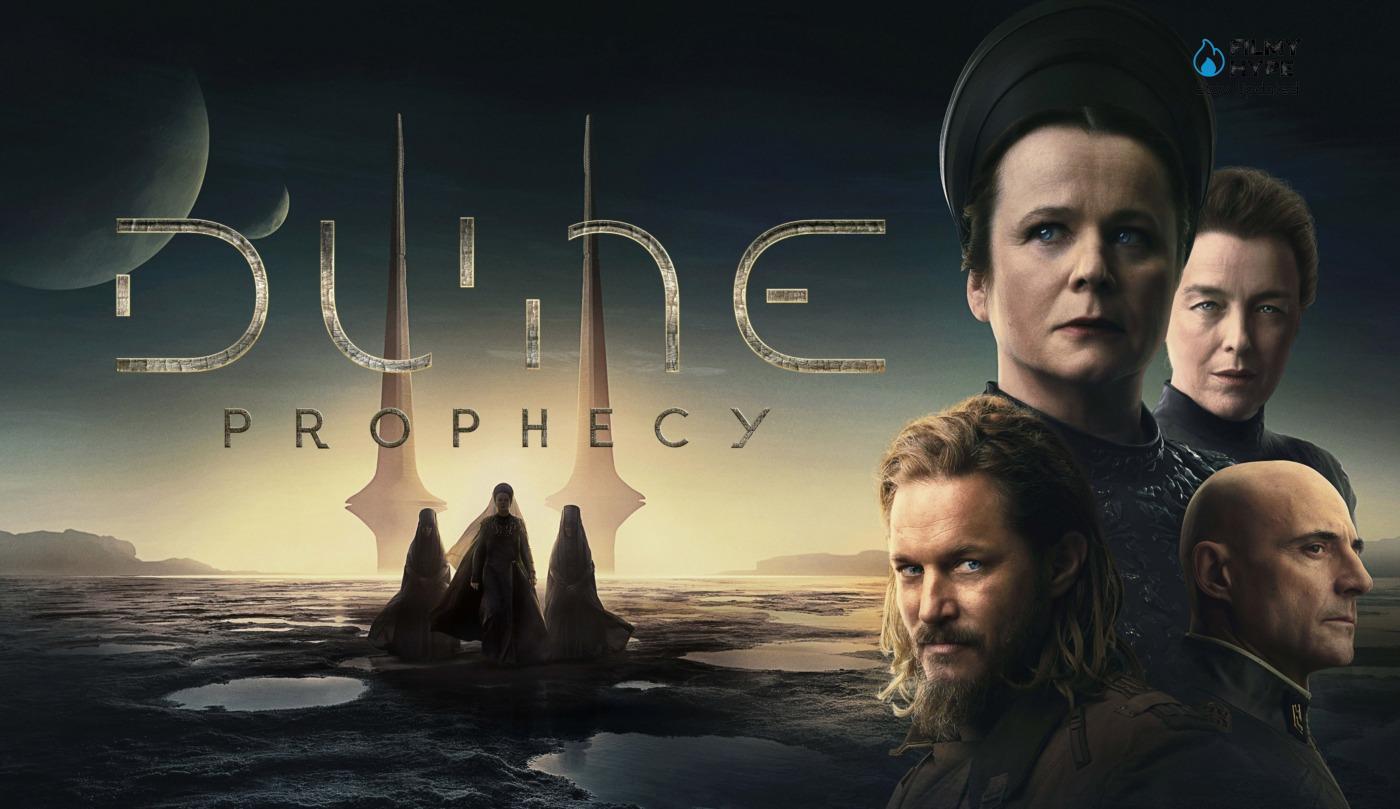
If there’s one thing that Dune: Prophecy manages to bring into sharp focus, it’s the absolute exceptionality of Denis Villeneuve’s cinematic diptych. Even though the HBO series coming to HBO is effectively a prequel to the two films that tell the story of the rise to power of Timothée Chalamet’s Paul Atreides, the television offshoot has very little in common with its cinematic progenitor. Not that it doesn’t draw heavily from the visual and narrative imagery created and curated by Denis Villeneuve, but it simply doesn’t have the economic means, the creative energy, and the ideas to move on the same level. It’s not a big flaw and the showrunner Alison Schapker (who from Alias to Altered Carbon boasts a long sci-fi pedigree) is relatively to blame in this sense, having been called in at the last minute to patch up a project with a long and troubled history.
Dune Prophecy Review: The Story Plot
Dune: Prophecy is set 10,000 years before the events of the first two chapters by Frank Herbert, connected to the rise of Paul Atreides, the Lisan al-Gaib. The imperial house Corrino is stable on the throne of the entire known universe, created at the end of the Butlerian Jihad, by which humanity managed to defeat and erase the artificial intelligence that had tried to destroy it. However, the situation is far from peaceful or stable, since the Great Houses are in constant conflict with each other for power and for the constant attempt to get closer to that throne, on which sits Javicco Corrino (Mark Strong) and Empress Natalya (Jodhi May). The wedding between their daughter, Princess Ynez (Sarah-Sofie Boussnina), and the firstborn of the Richesse house should take place, but it is a marriage that risks messing up the plans of many. Knowing everything and everyone, the dark and powerful priestesses of the Bene Gesserit sisterhood, led with an adamantine hand by Valya Harkonnen (Emily Watson).
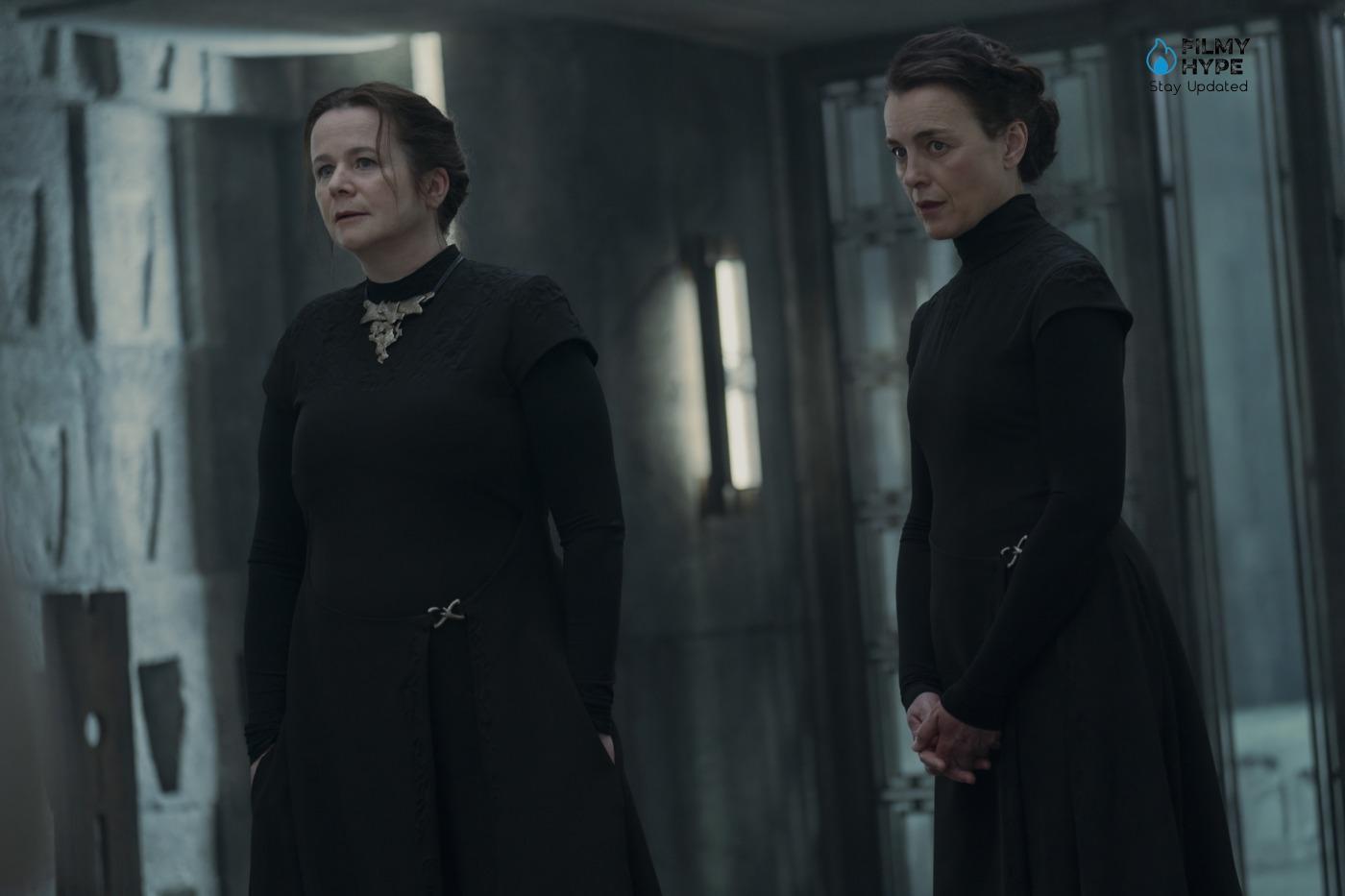
Torn between the will to bring balance to the Empire and redeem the honor of her fallen house, she will have to deal with the mysterious and fearsome Desmond Hart (Travis Fimmel), a war hero, who returned from the terrible planet Arrakis with dark and new powers. But what is his goal? How did he become like this? Meanwhile, betrayals, mysteries, secrets, and a dark prophecy about an unstable future besiege all those who move their lives and hopes around that throne. “Dune: Prophecy” was born from the success achieved by Denis Villeneuve, and from the beginning, it is proposed as a derivative creature, it takes its visual and narrative style, sets, and costumes, the same characterization of the universe conceived by Frank Herbert. The world that is proposed to us here is therefore very distant from that of the two television miniseries of the early 2000s, as well as from the glorious but failed attempt by David Lynch of forty years ago. In any case, this new creature signed by HBO is interesting, even if perhaps there is more ambition than quality in what we have seen so far.
Dune – Prophecy Review and Analysis
“Dune: Prophecy” offers a very interesting supporting cast, among which Olivia Williams, Tabu, and Aoife Hinds shine, in a story where women have a preponderant role from every point of view. The result obtained can also remind a lot of “The Foundations”, another interesting TV series, taken in a very freeway from another absolute pillar of science fiction reading. “Dune: Prophecy” from an aesthetic point of view has a simply astonishing quality, this concerns photography, direction, costumes, and special effects, however, you notice a certain uncertainty in the tone, inevitable if you think that the series has passed through the hands not only of Denis Villeneuve, who then had to give it up but also of many other showrunners, directors, and screenwriters. Sometimes it is difficult to understand whether the aim is to embrace a narrative more connected to feelings, or to the game of thrones, through a Machiavellian, ruthless, and surprising vision of that power, which Frank Herbert conceived as the great engine of human civilization.
It must also be said that in common with the work of the great writer, “Dune: Prophecy” has a cynical vision, but not devoid of beauty, melancholy, and poetry, of human relationships. The total clash between reason and feeling dominates from the very first episodes. The series is often violent, and dark, and its protagonists can be ruthless, but it is very interesting how reality and dream interpenetrate each other, something that the most faithful fans of Dune know is a distinctive feature of the narration of this universe. The flaws concern some unbelievable casting, some empty turns in terms of writing in the dialogues, a staging in the key moments not always up to expectations. However, the first four episodes have some great moments, they know how to give suspense, often there is also a wink to horror, and thriller, with frequent flashbacks that help to understand something more about the characters and their motivations, in their past. We will see how it ends, but for now, the premises are quite encouraging, hoping that some flaws will be filed down in the following episodes.
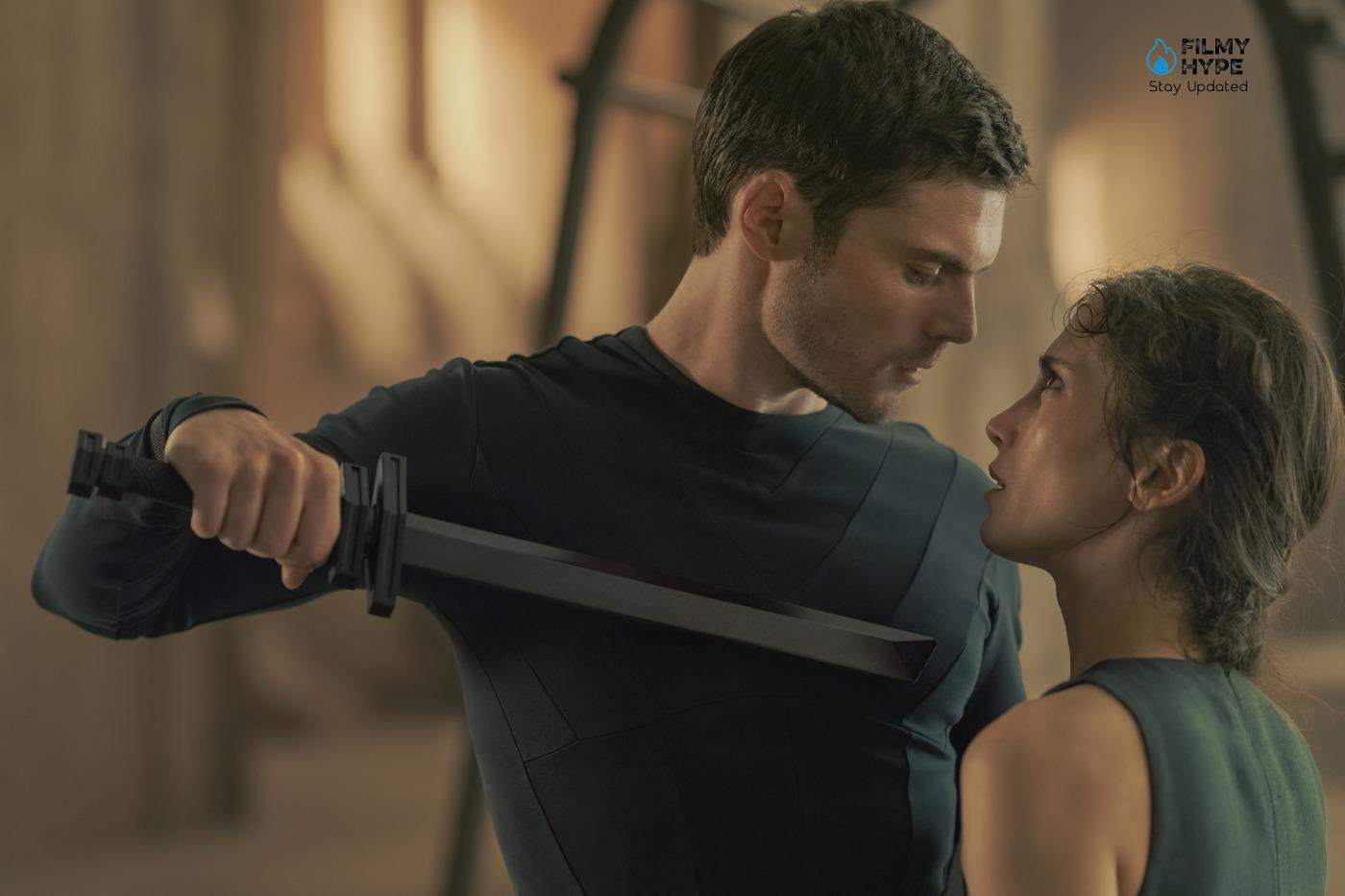
The challenge of this transposition is well summarized by its literary origin. The series is based on the novel Sisterhood of Dune (still unpublished in Italy), written by Frank Herbert’s son Brian with Kevin J. Anderson, who later became co-producer of Dune: Prophecy. The novel is the first of a trilogy that constitutes a thousand-year prequel to the first founding book of the world of Dune, the one written by Frank Herbert and adapted by Villeneuve. The story of the series is set in the Imperium where Paul Atreides will move, and see the centrality of Arrakis and the houses of Atreides and Harkonnen, but ten thousand years before the events told in the films. Just a century before, the war against the sentient machines that decreed the ban on these technologies ended. The Emperor is shaky on his throne, the indecision on the ban of the technologies just defeated is still palpable and the founder of the newborn order of the Bene Gesserit is on her deathbed from the beginning of the pilot episode.
Sisterhood of Dune is the beginning of what will later be the world of Dune, but it is also the sequel to a previous literary trilogy, Dune: Legends. Brian Herbert has substantially dedicated his professional life to expanding far and wide, chronologically and geographically, the boundaries of the imaginary world of his father’s saga. Legendary Pictures had already set its sights on both Sisterhood and the “unadaptable novel par excellence” Dune in 2016, acquiring the rights to both. The series we see today entered pre-production even before Villeneuve got to work, but it arrives much later because it has seen a continuous turnover of professionals in key positions of responsibility. First because in a series about sisterhood, there was a complete lack of female figures in writing and directing, then because those who had been approached had not produced a script capable of satisfying the broadcaster. Schapker arrives with the project already underway and shaky, years after the adaptation process began, with Villeneuve having already completed the first Dune film.
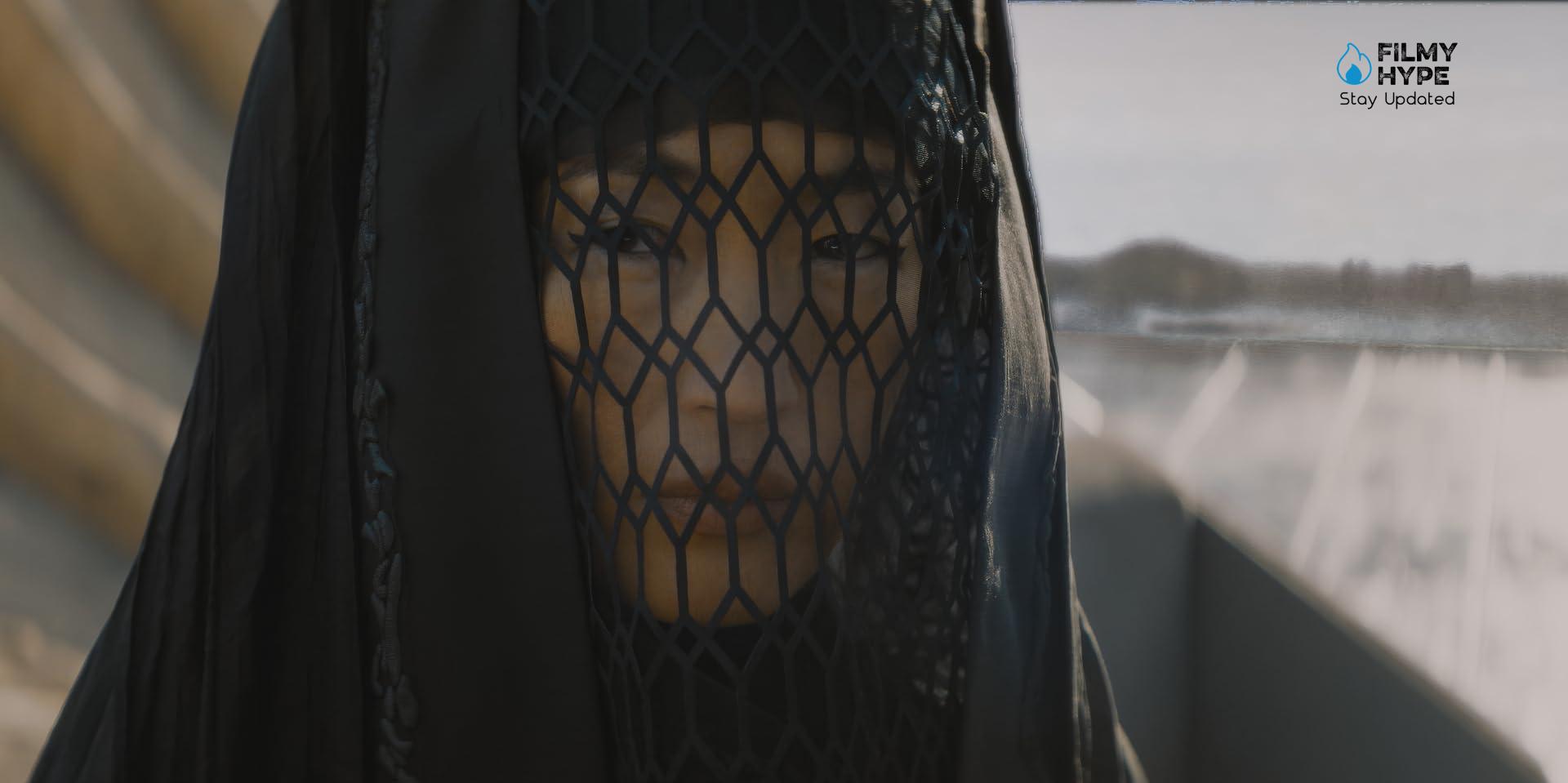
In the meantime, the scenario has changed profoundly. HBO Max is no longer the streaming counterpart of Warner Bros (but the collaboration between the two entities continues), COVID has passed, MeToo has been scaled down and with it the pressing need for female representation, the success of the first Dune has been confirmed. Furthermore, the film studios and the cable broadcasters among the most convincing in terms of series have found a way to expand some film franchises on the small screen, see the experiment The Penguin. Dune: Prophecy is definitely bigger and more complex in scope, production, and ambition, but it immediately reveals itself to be much less solid and convincing. It’s its fault up to a certain point because what emerges in this truly thankless comparison is the absolute genius and mastery of Villeneuve’s vision, which ranges in every direction: from the interior design to the music, from the acting glamour that brings a generation of stars capable of acting to the forefront to the very approach of an epic narrative of this scale.
It makes you sigh at the first 10 minutes of Prophecy because you can clearly see the difference between what a blockbuster can achieve when it spends its millions of dollars well and the level that a well-financed series can reach but that has no vision or charismatic figures at its side. The series opens with a short clip that shows the war between humans and machines. It feels like being in a Zack Snyder film because the appearance of the rebel sentient machines is an eyesore, alien to the Dune universe, and closely resembles the Snyderian aesthetic (since the production studio is the same, the suspicion that it is not a coincidence but a recycling is hard to dispel). An interminable clip of explanations follows what happened before, during, and after this war that we have been shown little and badly.
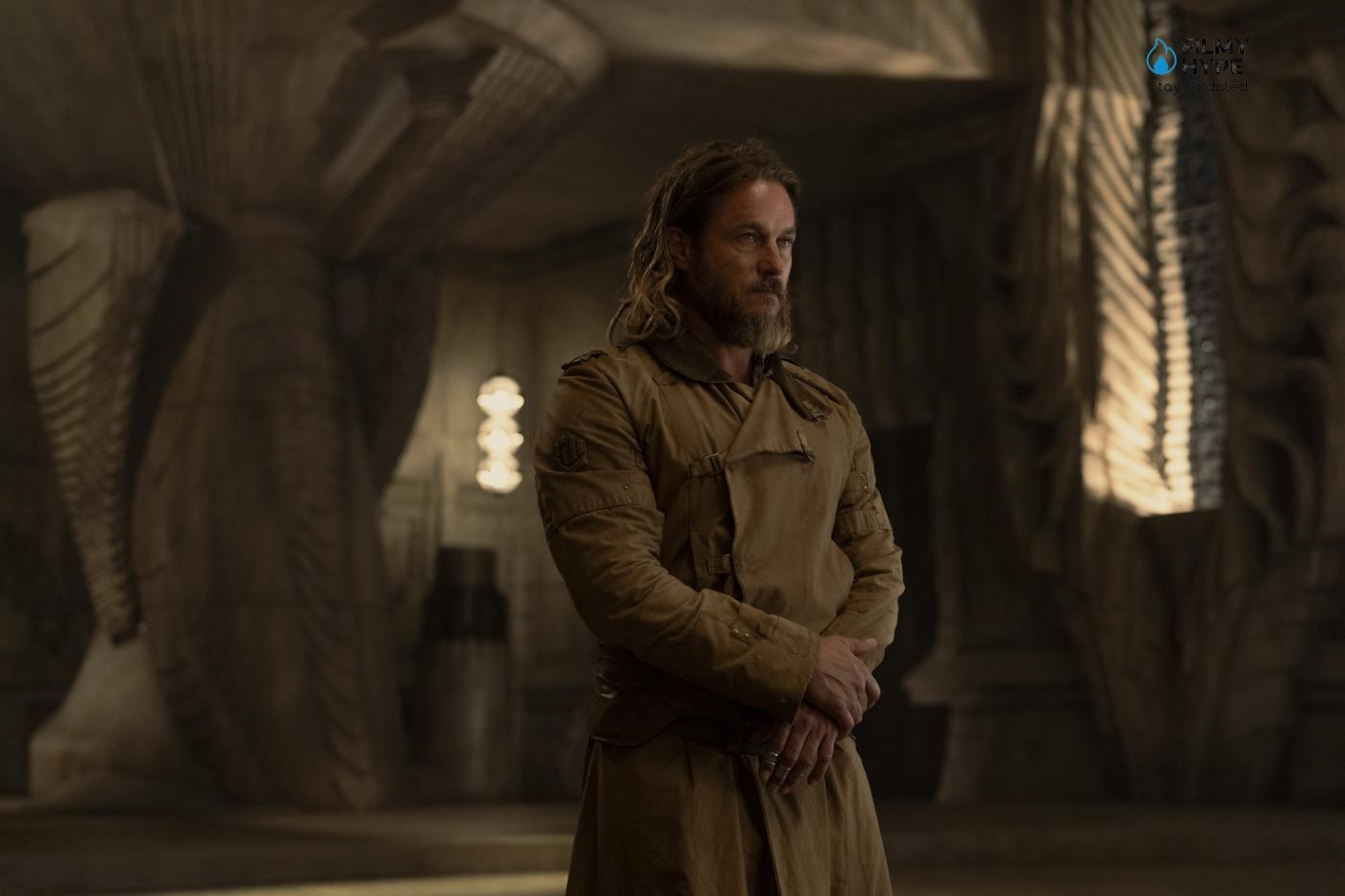
Just by starting it, you understand that the approach here is opposed to Villeneuve’s: there is no trust in the spectator, and there is no seduction of making him discover and understand the world in which he finds himself little by little. He is imagined distracted, dividing his attention between the television screen and the screen of his cell phone, he is inundated with information. It almost makes you want to press the stop button, because Dune: Prophecy is so expository that it risks cracking even the magic of the films, which expertly does what to say, what to leave to be understood, and what to keep silent. At the center of the intrigues of Dune: Prophecy are two sisters of the Harkonnen house, allies within the Bene Gesserit order but with very different natures. Emily Watson plays Valya Harkonnen, the one who received the task from the founder of the sect to save Bene Gesserit from destruction. A grave danger that appeared in a vision pushes the first Reverend Mother to choose Valya, asking her to place the order at the nerve center of imperial power, but always remaining in the shadows.
Valya firmly believes in a more active and political role of a parareligious order and protects the genetic hybridization program that aims to create an ideal ruler, that is, controllable by the sect. More nuanced is the position of Tula Harkonnen, who has the face of Olivia Williams and a less harsh, more maternal character. Valya’s election was consumed in blood and Tula watches her back, protecting her many secrets but also acting as a talking cricket for her ally. Meanwhile, within the Bene Gesserit order, a new generation of Truthsayers is growing, with a personal background and a nature that the viewer will be able to discover, as well as the palace intrigues that Valya tries to steer from afar. At the head of the Imperium is Javicco Corrino (Mark Strong), whose throne and control over Arrakis are not so solid. Just when an internal rebellion and an uneasy alliance with a rival house undermines his authority, a sort of Rasputin from Arrakis appears on the horizon. Desmond Hart, played by Travis Fimmel, is an adventurer with a mysterious past who had a close encounter with a desert worm. He came out alive and with a series of terrifying powers, capable of compromising the very fate of the Bene Gesserit, who in his eyes are trying to take power from the Imperium by plotting in the shadows.
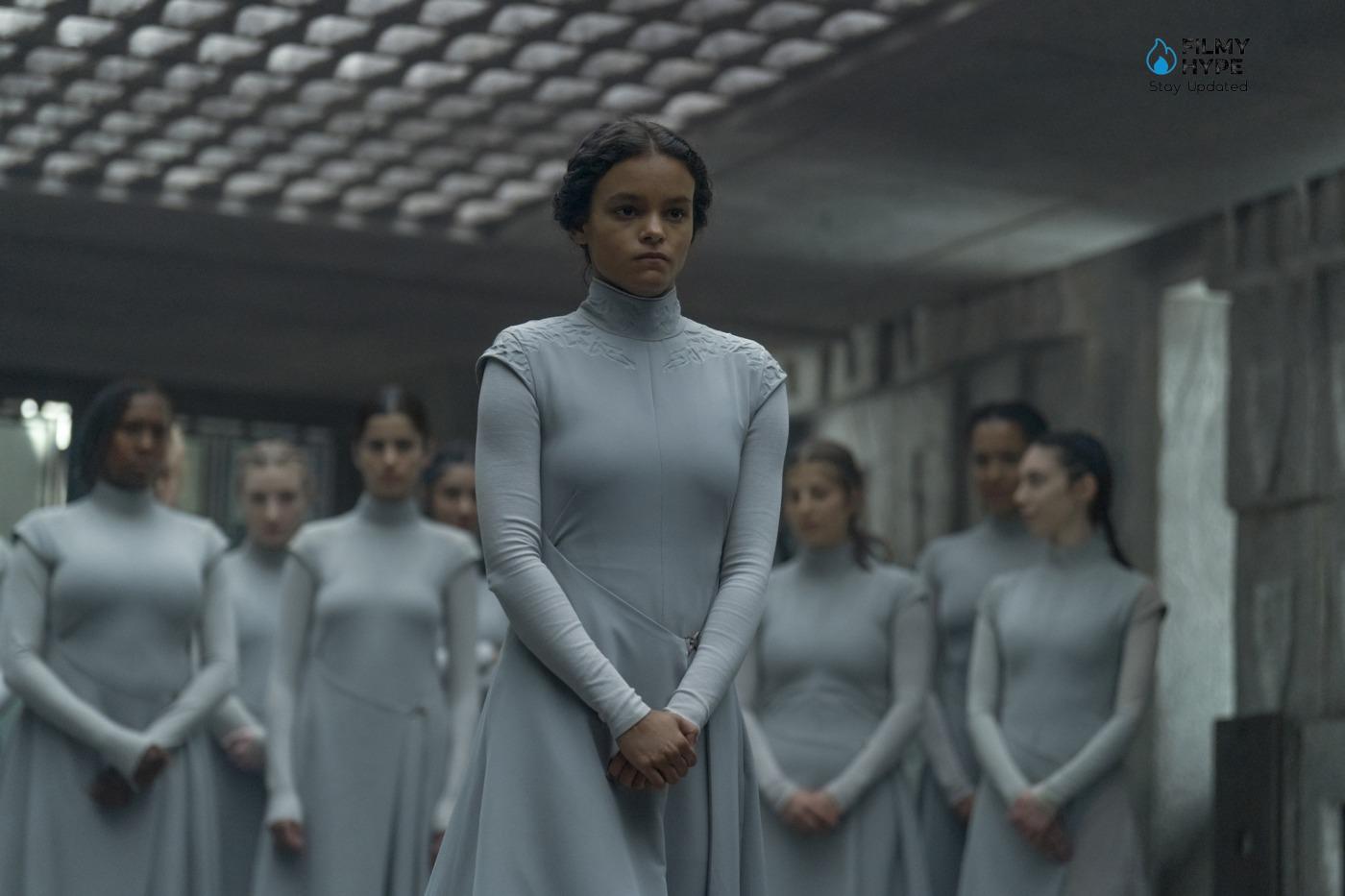
She is not entirely wrong. Valya wants to have Princess Ynez (Sarah-Sofie Boussnina) in her order, who with an arranged marriage to a still-child scion will be able to ascend to the throne and exercise power. The fate of the girl weighs on a second catastrophic prophecy, in addition to that of the founder whispered in a few words on her deathbed. At her side moves a prince who aspires to much more than a secondary role, a fervently religious mother, and a series of figures with purposes to be clarified. The main, but burdensome, limit for the series’ destinies is that Dune: Prophecy completely lacks its personality. It wouldn’t have been easy to dig its approach in the deep furrow of what Villeneuve did, but Prophecy doesn’t even try to do so. We must recognize that it has the thankless role of demonstrating the basic, sometimes banal reality behind the legends and idolatries that make the story of Paul Atreides so fascinating, about which we continually ask ourselves: is he predestined, is he following exactly the path traced for him or is he demolishing a thousand-year-old plan from within? Here, we see the historical, scientific, and not always far-sighted bases of this plan in Dune: Prophecy.
The series’ cardinal sin is to be compared (if not actively seek it) to another flagship HBO title. A prophecy based on a vision whispered on the point of death by a ruler that was perhaps distorted by those who heard it, two women with very different personalities who respect each other but find themselves on opposing planes, a series of marriages, children, and betrayals between the sheets that seal a game that has at its center the dominion of a kingdom in which one must deal with powers so terrifying that they border on magic. From the start, Prophecy presents itself as an epigone of the Game of Thrones spin-off House of The Dragon. It doesn’t even have the light with which that product at times embraces its fantasy soap tones. Dune: Prophecy would like to have seriousness and gravitas, but when the royal offspring end up in a nightclub rubbing against handsome guys with their agenda, it’s really hard not to draw a comparison with the high-profile HBO title.
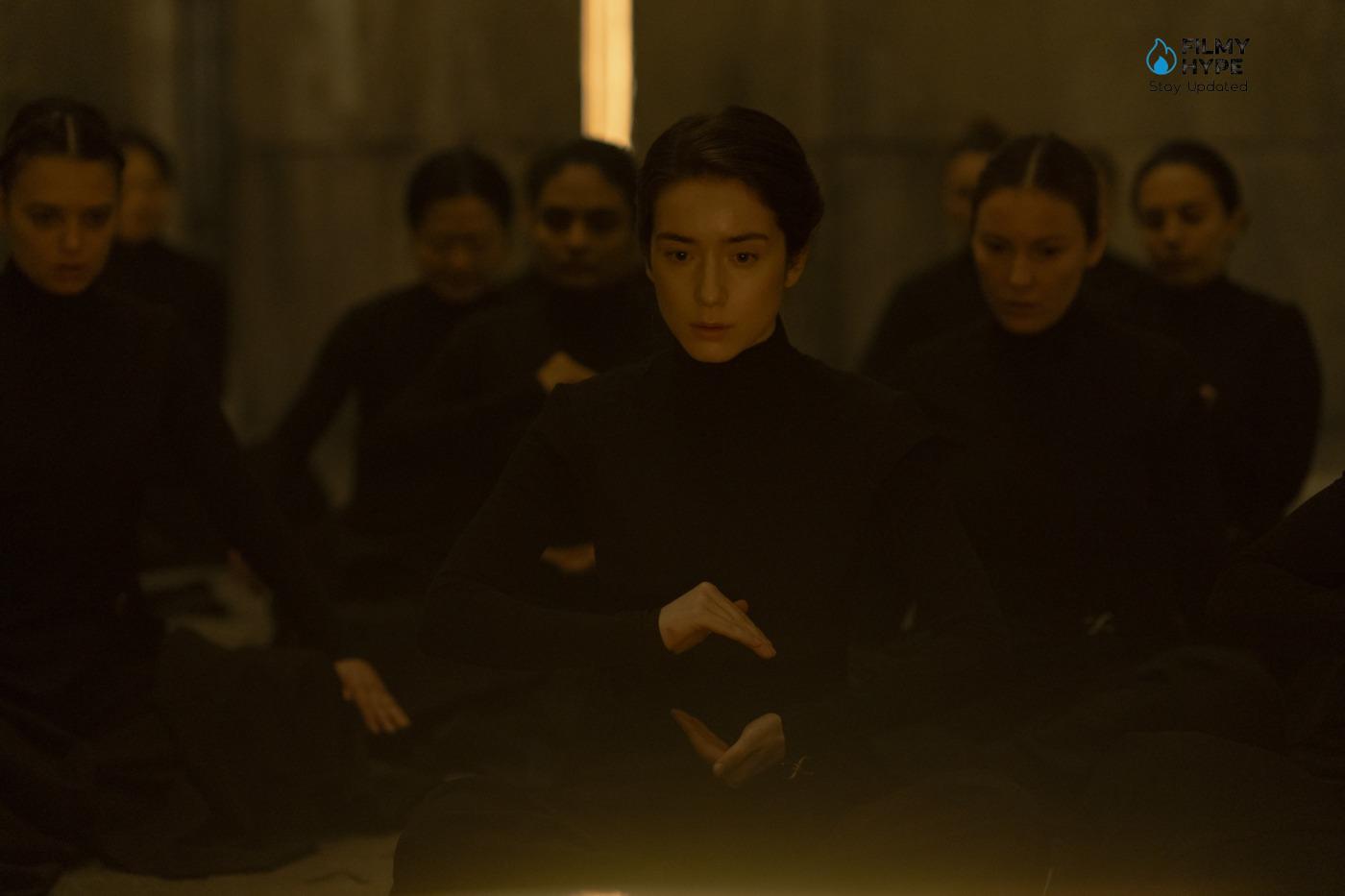
So, everything in the Dune film had a meaning, that visual dimension that seemed to have a symbolic value behind it, a basic coherence derived from a long history inside and behind it becomes an aesthetic pose, from the costumes to the floating lights. If the series does not sink irredeemably, it is because (just like House of The Dragon) it has a spectacular ensemble of Anglo-Saxon actors ready to say and do the worst, for our delight. Emily Watson plots in the shadows, Olivia Williams suffers her subjugation, and Mark Strong does not want to be a puppet but has just the power to decide who to be manipulated by. They are not a surprise, but rather a fixed point in a series that struggles to lay exciting foundations. The stellar cast chosen by the American network contributes to making the series yet another hit target. Above all, the mysticism of Fimmel’s gaze (already appreciated in Vikings), the desperation of Strong, the lucid determination of Watson, and the fear of Williams are striking expressions that follow one another on the small screen and enrich the vision of the product. After True Detective: Night Country, the second season of House of The Dragon and The Penguin, for HBO it is time to collect the applause for Dune: Prophecy and toast to a 2024 of excellent results.
Dune – Prophecy Review: The Last Words
Dune: Prophecy begins to lay the foundations for the intrigues of power that will accompany us until the end of the series, which for the moment does not have the visual impact of Villeneuve’s films but has the heart of Herbert’s novels. An exceptional cast takes us inside the political dynamics of the space saga so familiar to Herbert. Dune: Prophecy is not off to a stellar start as hoped. It is certainly not a total failure, but a series with these princely narrative and production origins is subject to very high expectations that it struggles to meet. It is truly disheartening to see those in charge of the project capitulate when asked to create an epigone of George RR Martin’s saga, without really focusing on the specificity of the Herbert saga. Fantatelevision, a simple suggestion of the writer? Who knows. However, the impression is that the clues are numerous, and if there is a story that lends itself to a basic conspiracy…
Cast: Travis Fimmel, Camilla Beeput, Sarah Lam, Emily Watson, Olivia Williams, Jodhi May, Mark Strong, Sarah-Sofie Boussnina, Josh Heuston, Chloe Lea, Jade Anouka
Director: Anna Foerster, John Cameron, Richard J. Lewis
Streaming Platform: HBO Max
Filmyhype.com Ratings: 4/5 (four stars)



